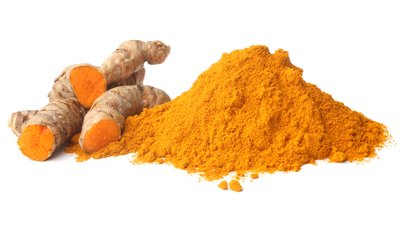Look no further than your spice cabinet for a powerful shot of antioxidants. Turmeric has emerged as a potent natural supplement with uses ranging from fighting muscle soreness to keeping your skin in good shape.
Before you start dumping this bright yellow spice into your protein shake, let's take a closer look at what the science says.
What Is Turmeric?
You probably recognize turmeric, or curcuma longa, from your spice rack. Also known by its active compound, curcumin, it's widely known for its bright yellow color. It is made from the root of the turmeric plant, which is native to India and Southeast Asia. It's one of the components of curry, but is also included on its own in many Southeast Asian dishes.

Beyond its use in the kitchen, this spice has been used in traditional medicine for hundreds of years, most prominently in the Ayurvedic tradition. Partially due to this popularity, curcumin has been extensively researched for decades. Recently, it has been earning notoriety as a "super spice" of sorts, with a wide range of potential benefits.[1] It's becoming popular both as a encapsulated supplement, and as an ingredient in lotions and face creams.
What Does Turmeric Do?
Although the bioavailability of the curcumin in turmeric is still being studied, clinical trials have found it has potential to be a powerful antioxidant.[1,2] It also has been found to help combat exercise-related pain and inflammation.[1, 3-6]
Turmeric As an Antioxidant
Our bodies get subjected to oxidative stress through many mechanisms, including exercise, unhealthy body composition, the environment we live in, and certain foods we eat.[7] This type of stress can cause cell damage through the creation of free radicals, as well as speeding up the aging process.[8]
Turmeric's antioxidant properties help fight damage caused by oxidative stress. Studies have shown it to have many potential benefits, including improving blood flow and adding resilience to skin.[3]
Can Turmeric Really Help My Skin?
It looks promising! The curcumin in turmeric has antioxidant properties that can help combat skin irritations, and may even diminish acne scars when applied topically. Although full-scale investigations have yet to confirm this treatment, scientific evidence points to curcumin as a promising natural skincare remedy.[5]
Will Turmeric Help Me Recover Faster?
Perhaps! A recent study in the European Journal of Applied Physiology found that curcumin caused a decrease in exercise-related muscle soreness, or DOMS. This study points to curcumin's potential importance in boosting muscle recovery, and getting you back to your next workout faster.[5,6]
Are There Any Negative Effects or Drug Interactions?
There are no known negative effects of turmeric, and it's generally considered safe and effective.[2] According to the American Association of Pharmaceutical Scientists, doses up to 8 grams per day are considered safe.[8] However, caution is advised when pairing curcumin with antiplatelet and anticoagulant medications.[9] Be sure to tell your doctor all supplements you are taking, to avoid any potential risks.
Recommendations for Turmeric Intake
When shopping for curcumin or turmeric supplements to help with exercise-related inflammation, consider looking for one that contains piperine or is bound to a phytosome to enhance absorption of the nutrient by your body. These are relatively common additions to both turmeric and curcumin supplements.[10,11]
If you're after turmeric's antioxidant benefit, 3-4 grams per day of raw curcumin powder or turmeric can be added to a protein shake or food. It may help to include black pepper—which contains the absorption-booster piperine—for better bioavailability.[8]
References
- Jurenka, J. S. (2009). Anti-inflammatory properties of curcumin, a major constituent of Curcuma longa: a review of preclinical and clinical research. Alternative Medicine Review, 14(2).
- Sikora, E., Scapagnini, G., & Barbagallo, M. (2010). Curcumin, inflammation, ageing and age-related diseases. Immunity & Ageing, 7(1), 1.
- Goel, A., Kunnumakkara, A. B., & Aggarwal, B. B. (2008). Curcumin as “Curecumin”: from kitchen to clinic. Biochemical Pharmacology, 75(4), 787-809.
- Davis, J. M., Murphy, E. A., Carmichael, M. D., Zielinski, M. R., Groschwitz, C. M., Brown, A. S., ... & Mayer, E. P. (2007). Curcumin effects on inflammation and performance recovery following eccentric exercise-induced muscle damage. American Journal of Physiology-Regulatory, Integrative and Comparative Physiology, 292(6), R2168-R2173.
- Drobnic, F., Riera, J., Appendino, G., Togni, S., Franceschi, F., Valle, X., ... & Tur, J. (2014). Reduction of delayed onset muscle soreness by a novel curcumin delivery system (Meriva®): a randomised, placebo-controlled trial. Journal of the International Society of Sports Nutrition, 11(1), 31.
- Nicol, L. M., Rowlands, D. S., Fazakerly, R., & Kellett, J. (2015). Curcumin supplementation likely attenuates delayed onset muscle soreness (DOMS). European Journal of Applied Physiology, 115(8), 1769-1777.
- Sies, H. (1997). Oxidative stress: oxidants and antioxidants. Experimental Physiology, 82(2), 291-295.
- Gupta, S. C., Patchva, S., & Aggarwal, B. B. (2013). Therapeutic roles of curcumin: lessons learned from clinical trials. The AAPS Journal, 15(1), 195-218.
- Chainani-Wu, N. (2003). Safety and anti-inflammatory activity of curcumin: a component of tumeric (Curcuma longa). The Journal of Alternative & Complementary Medicine, 9(1), 161-168.
- Shoba, G., Joy, D., Joseph, T., Majeed, M., Rajendran, R., & Srinivas, P. S. S. R. (1998). Influence of piperine on the pharmacokinetics of curcumin in animals and human volunteers. Planta Medica, 64(04), 353-356.
- Jäger, R., Lowery, R. P., Calvanese, A. V., Joy, J. M., Purpura, M., & Wilson, J. M. (2014). Comparative absorption of curcumin formulations. Nutrition Journal, 13(1), 11.

